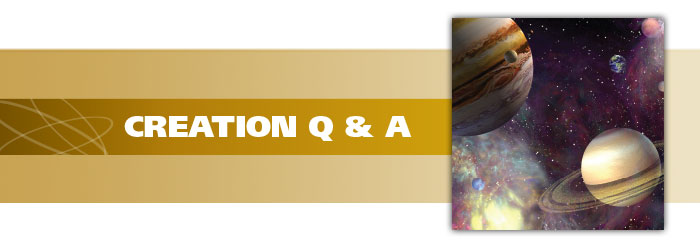Go to a standard planetarium show or watch a television documentary on the solar system and you’ll hear that the planets formed about four and a half billion years ago. But the many evidences favoring recent planet formation counter that idea. Each of these evidences contains a clocklike natural process that is still ticking even though it should have gone dead long ago if it began billions of years ago.
For example, Saturn’s beautiful rings look bright and clean. Billions of years of space dust should have tarnished the ring’s ice crystals into a dull gray long ago. Saturn’s moon Enceladus continues to jet ice from 101 geysers near its south pole. Secular astronomers face a challenge in explaining why all this material didn’t exit Enceladus millions of years ago and why this little moon still has enough energy to fuel its many geysers.1
Next, some planets and moons emit too much heat to fit the billions-of-years model. Neptune emits twice the heat it receives from the sun, and Enceladus emits some 10 times the heat secular scientists predicted.2 If God made Neptune and Enceladus relatively warm in the beginning, they should still have extra heat after only thousands of years—but not billions.
Planetary atmospheres also boggle long-age expectations. Researchers recently puzzled over the methane atmosphere around Saturn’s big moon Titan. They wrote, “A question that remains unanswered is, where is all the methane coming from?” Radiation from the sun permanently converts the methane into larger molecules, mostly ethane. The ethane should have fallen to the surface for millions of years, forming hydrocarbon oceans. But “that turned out to be wrong as well,” they wrote.3 Titan’s youthful atmosphere still has plenty of methane.
Even one of the many newfound, very distant extrasolar planets—named GJ 1214b—challenges secular scenarios. Some astronomers believe it has a very watery composition. But it orbits near a red dwarf star with enough radiation to have vaporized the planet’s water—unless the planet is young enough to still have some originally created water.4 Finally, astronomers labeled weird, blade-like formations of methane ice on Pluto’s youthful surface as standing for “a few tens of millions of years.”5 How could Pluto have avoided formation-erasing collisions like those that made the moon’s impact craters for all that supposed time?
These examples merely dip a toe into the deep waters of youthful planetary features, including young-looking magnetic fields. ICR has a collection of articles (ICR.org/recent-universe), plus a new book (Guide to the Universe), that illustrate young-looking planetary and other outer space features. They confirm the recent creation that the Bible clearly teaches. Isaiah 51:13 says, “And you forget the LORD your Maker, who stretched out the heavens and laid the foundations of the earth.” Science and the Bible agree that God made the lights in the sky, including planets, only thousands of years ago.
References
- Porco, C., D. DiNono, and F. Nimmo. 2014. How the Geysers, Tidal Stresses, and Thermal Emission across the South Polar Terrain of Enceladus Are Related. The Astronomical Journal. 148 (3): 45.
- Howett, C. J. A. et al. 2011. High heat flow from Enceladus’ south polar region measured using 10–600 cm-1 Cassini/CIRS data. Journal of Geophysical Research. 116 (E3): E03003.
- Mitchell, J. L. and J. M. Lora. 2016. The Climate of Titan. Annual Review of Earth and Planetary Sciences. 44: 353-380.
- It may actually have very little water, however. See Kempton, E. M.-R., K. Zahnle, and J. J. Fortney. 2012. The Atmospheric Chemistry of GJ 1214b: Photochemistry and Clouds. The Astrophysical Journal. 745 (1): 3.
- Moores, J. E. et al. 2017. Penitentes as the origin of the bladed terrain of Tartarus Dorsa on Pluto. Nature. 541 (7636): 188-190.
* Mr. Thomas is Science Writer at the Institute for Creation Research and earned his M.S. in biotechnology from Stephen F. Austin State University.














